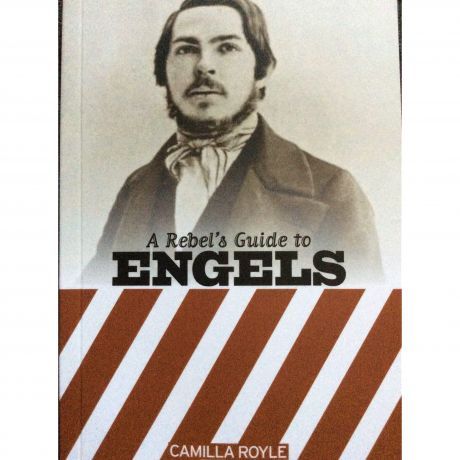Reports
You are here
Review: A Rebel’s Guide to Engels by Camilla Royle

May 13, 2020
This is the way Camilla Royle begins her Rebel’s Guide to Engels: “Friedrich Engels was born on 28 November 1820 in Barmen (now Wuppertal) in what is now Germany. Despite being from a fairly wealthy family he went on to become one of history’s most important revolutionary socialists. He was a disappointment to his parents and a traitor to his class.”
This little book is a great addition to the previous Rebel’s Guides on socialists and activists such as Marx, Trotsky, Lenin, Rosa Luxemburg, Alexandra Kollontai and Malcolm X, all available from Bookmarks.
There have been many attempts, often by academics, to separate Marx and Engels and to label Engels the less gifted thinker of the two. He was the crude materialist who could not follow Marx’s genius. Royle’s book does a lot to correct this false picture and gives him his due as a radical thinker in his own right.
The whole of Marx and Engel’s output should be seen as a collaboration in many ways. Firstly, there is the fact that Marx’s theoretical output would have been severely limited without the financial support that Engels offered to Marx and his family throughout their lives, particularly when Marx was toiling over Capital.
On a deeper level, though, the collaboration between these two radical thinkers and activists influenced the course of both their work and their lives.
Shortly after Marx and Engels met, when they were in their early to mid-twenties, they would collaborate on writing The Communist Manifesto, originally written as the founding document of The Communist League. Both Marx and Engels had much to do with the transformation of the league’s politics, signified by the change in the league’s slogan from “all men are brothers” to “Working men of all countries, unite!”
For Marx and Engels socialism grew from material reality, not utopian ideas. Through their collaboration and their observation of workers’ struggles and workers’ material conditions (as in Engels first book The Condition of the Working Class in England) they came to see that it was through workers’ interaction with the conditions of their existence and not through some blueprint drawn up by middle-class socialists, that the impetus for change would come.
Their shared vision of socialism was put forward by Engels in a work which is still very valuable today: Socialism: Utopian and Scientific, a book which highlights their materialist philosophy and provides a critique of the ideas of Utopian socialists, no matter how much they may have admired their efforts in the struggle for human emancipation.
After the death of Marx, Engels revisited Marx’s notes on the work of anthropologist Lewis Morgan, who studied still existing hunter/gatherer societies to build a picture of pre-class societies.
Out of this work Engels published The Origin of the Family, Private Property and the State – still a ground-breaking book which established important insights into the origins of the modern state, the division of society into classes and the rise of the modern family, which Engels refers to as ‘the world historic defeat of the female sex’.
Some of the evidence Engels cites has been subsequently shown to be inaccurate or questionable, based on the incomplete anthropological data available to him at the time of writing, but his general analysis stands. In particular, his understanding that the phenomenon of women’s oppression is not some unchanging feature of human nature, but rather a historical and changing reality, depending on the kind of society human beings live in is of critical importance, as British Marxist Chris Harman explains:
“What is important is Engels’ insight that there have been variations, even within class society, in the nature of the family and the character of women’s oppression. The whole process cannot be subsumed under one single category of “patriarchy” in the way that many modern feminist theorists have tried to do. To say this is not to ignore women’s oppression in each case, but to insist on the changes it undergoes – a precondition for recognising it is not some expression of human nature, but a product of concrete historical developments, something that can be done away with by further developments.”
Attempts to discredit Engels have involved looking for signs in his personal life of his hypocrisy or hidden sexism. Some of this has centred around his relationship with Mary and Lizzie Burns, daughters of Irish immigrants who lived in Manchester’s most overcrowded slums. But the assumptions in biographical writings about Engel’s life that portray the sisters as passive victims of the lustful Engels mostly show the bias of the writers themselves.
It is doubtful that Engels would have been able write his book on the conditions of the working class in Manchester without the Burns sisters as guides.
This is not to argue that Marx and Engels were perfect, or untouched by the prejudices of the times in which they lived, but the real question remains: which side were they on?
In their life and work they show time and again their concern with the plight of the exploited, the poor, the oppressed. For Engels overturning the brutal system of capitalism was something that could only be accomplished by the same class that was under the thumb of the capitalist exploiters and on whom the capitalists depended for all their wealth creation.
Royle finishes her book this way: “Engels always maintained that another world is both possible and necessary. Today it is just as necessary to learn from his ideas and to fight for a better future.” The Rebel’s Guide is a good place to start if you want to learn more about this important revolutionary.
Order the Rebel's Guide to Engels at the Bookmarks the socialist bookshop
Section:










